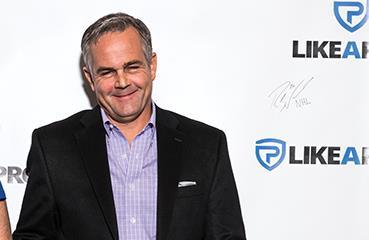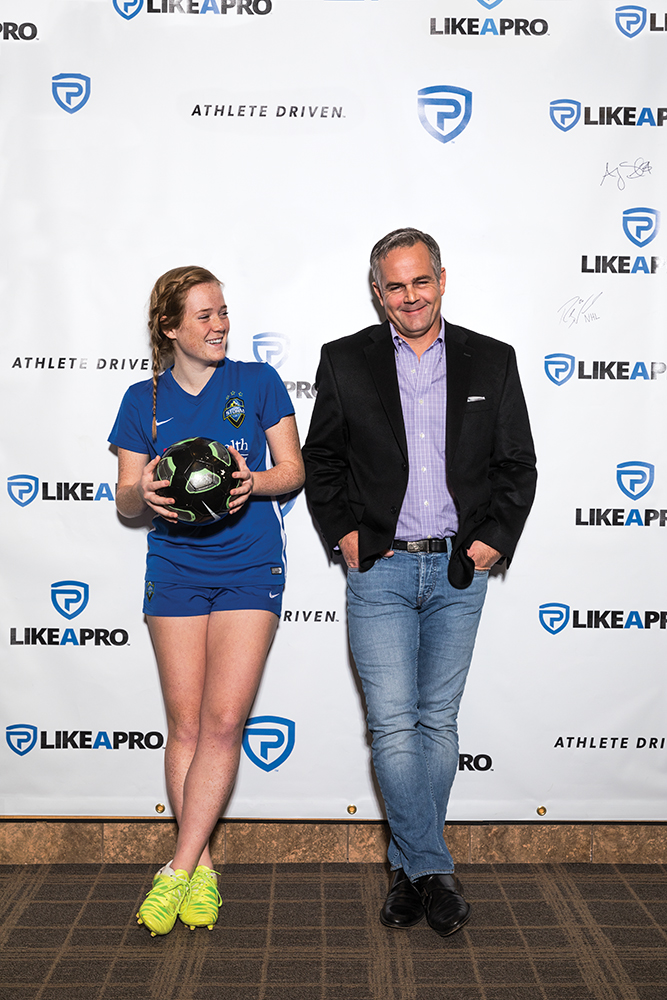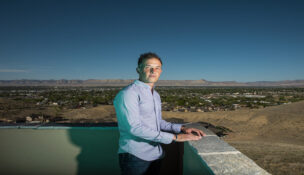Scott Schaible’s latest startup connects athletes with fans
A serial entrepreneur talks process
Gigi Sukin //January 4, 2017//


Scott Schaible’s latest startup connects athletes with fans
A serial entrepreneur talks process
Gigi Sukin //January 4, 2017//

Scott Schaible has played founder more than a couple times. After an early stint in the nation’s capital working on high-profile political campaigns, he came to Colorado and started a public relations firm, followed by two pet projects. His latest venture, Like A Pro, connects professional athletes to their fans. We sat down to talk to Schaible, 52, about building businesses.
CB: The term ‘serial entrepreneur’ gets thrown around a lot nowadays. Do you see yourself that way and did you always set out to be a founder?
SS: People definitely describe me as this crazy inventor guy.
It’s not a churn and burn kind of thing, though. I’ve never started a business with the goal of selling it for this many dollars, this many months or years from now. It’s typically been more driven by the question: Is there a product that solves this problem?
What led you to ask that question with Like A Pro?
My daughter Linden (pictured here) had an opportunity to meet Carli Llyod when the U.S. Women’s National [soccer] Team was in Denver for a game in August 2012. It was that exact moment – Linden wanted to get the same cleats as Carli Lloyd … she was 13 at the time.
For probably three months I kept going back to Google and seeing if there was already some source that was quick and streamlined to find the cleats, like what I’m building today, and I never found it.
Now, almost every single investor in our angel round, one of the first things they’ve asked is, ‘How does this not already exist?’
Describe the platform.
I built a mock profile for Carli Lloyd: a simple head shot, bio, stats and then product stuff. Cleats. Shin guards. Click here to buy my jersey. Basic stuff. The next tab was lifestyle stuff. I didn’t want this to ever just be about sporting goods.
So you thought the market was ripe for people to dig deeper about the athletes they admire and make purchases accordingly?
The thing about sports is, it’s not about age. If you were a New England Patriots fan when you were in your 20s, you don’t stop liking them now that you’re in your 70s. I think sports are so compelling and so tribal.
What were the next steps?
I had two people in mind who I wanted to call. The first was Bill Sedgwick, who is a renowned digital marketing and SEO guy, an early MapQuest employee. He built their entire revenue program back in 1995, and his reaction was nothing short of, ‘I love it and I want to be a part of it.’ We met in 1994. He had launched one of the first cigar of the month clubs, and I invested a couple thousand dollars. We were tragically underfunded, which is the bane of most startups, and it ended up going under about two years later. But it never had any impact on our friendship.
The other person was Kurt Overhardt, a professional sports agent. I said, ‘You write contracts and do sponsorship deals with pro athletes for a living. Here’s my idea. Poke holes in it.’ And he said, ‘It’s a brilliant idea and I think all of my hockey players would probably love it.’ And then he asked, ‘What are you going to call it?’ That’s when he told me he owned the URL for LikeAPro.com.
Take me back and talk about other accomplishments that brought you to here and now.
I grew up in northern New Jersey and I went to Lafayette College in Pennsylvania and studied international affairs.
I moved to Denver in 1993. I had run the state office for U.S. Sen. Frank Lautenberg from New Jersey from 1991-1993 after working for several years in Washington politics. I had been to Colorado enough times that I just loved it. I liked the climate, the mountains. I liked to snowboard. So I had a five-year plan in place and made it happen.
And you continued to work in politics?
I started my own PR and communications firm, Counterpoint Communications, and for whatever reason my primary clientele list was developers and homebuilders. The Black Creek Group was my first client. I did some work for MDC Holdings, which is the parent company of Richmond American Homes. I did some political consulting work as well.
How long did that last?
I never really closed it down, per se. In 1999, my girlfriend at the time and I bought a puppy and you do what everyone else does: You put a collar on the dog with his ID tag and his rabies tag. And I realized the first couple nights we had him that she was a light sleeper and we had this, ‘It’s me or the dog’ moment. So I went to a couple different pet stores and asked if they sold something that I could put on my dog’s tags to keep them from jingling, and the people looked at me like I was crazy.
So I cut up an old wetsuit in my garage and sewed this thick neoprene and made this crude pouch. I put it over the dog’s tags and I solved my problem. And for the next year, anytime we would walk around with the dog, people would stop me on the street and ask where did you get that little tag bag.
And so I met with a patent attorney and a year later I went to my first pet industry trade show with the Quiet Spot pet tag silencer in April 2000. Now we sell a couple thousand of them a week, and it’s made right here in Denver.
Did the success surprise you?
It took awhile to build it. I never stopped my PR business. I could fulfill orders after hours and on weekends. Ever since I was a kid, I would think up an idea and not do anything about it. So finally, even against the wishes of my wife at the time, I wanted to give it a go.
And at this point you have two businesses you’ve started.
Yeah. Bootstrapped them. Didn’t raise any money.
What next?
In 2008, which was theoretically the worst time to have an idea to start a business, a guy named Jerry Wheeler and I created a company called Billboard Ecology. The mission was to take retired outdoor advertisements, 300 million square feet of which end up in landfills each year, and repurpose them into tote bags, messenger bags, dog leashes and collars. We’ve kept at least 7 to 8 million square feet of billboards out of landfills to date. We’ve done projects with companies like Chipotle and Southwest Airlines and Subaru.
And now you have Like A Pro. How has the concept grown?
We signed our 100th athlete [in early December] and there’s 100 more in the pipeline and it’s escalating. We’ve met with probably 250 agents and of those, I think one said he wasn’t interested. The athletes we have so far are so excited and engaged.
What have you learned?
The interesting thing about athletes is, we might have a pro rugby player from the East Coast who only has 10,000 Twitter followers. But those 10,000 followers may be way more engaged than an NFL player with 200,000 followers. So really it’s about engagement rather than quantity of followers.
What are you most excited about with Like A Pro?
We recently upgraded our status with Amazon.com, which has been one of our primary affiliates. When you look at an athlete’s profile and identify the things they use; Amazon is one of the primary sources that fulfills that order. And then the commissions on that order we split 50-50 with the athlete. So we’ve already been working with Amazon for many months. But recently we were upgraded into this Amazon Exclusives program, specifically designed for celebrities and athletes. This is a very poignant moment in the arc of this company. That heightened relationship with Amazon brings with it some marketing horsepower and a better level of commision on the affiliate sales, which is good for everybody.
Any hurdles you anticipate?
Everyone involved with a startup knows the ongoing hurdle is fundraising. We’ve been blessed to finish out our $1.5 million angel round, and probably 80 percent of the funds we raised were local within Colorado. We’re putting together our next fundraising round now and determining the new valuation and the amount of funds we’re going to bring in to get us to the next level.
Do you have any opinions or insights on the boom in entrepreneurship?
I get less funny looks today than I used to when I say this: I’m not sure that a four-year bachelor’s degree makes sense anymore. Which is a hard thing to say, because I’ve got kids in prep school who work hard and get good grades and I want them to go to school. But I also 100 percent understand that if a year from now, in her senior year of high school, my daughter tells me, ‘I have an idea for a business,” I think i would say I still want you to apply to school and get in, but then you can defer for a year and let’s figure out how we would get this idea funded and off the ground. I’m not an economist. I don’t pretend to have some macro understanding of the way the world works, but I do think the tradition of going to college and getting this kind of job at this big company is going away and I applaud anyone’s creative or scrappy approach to figuring out a way to make a living.



























